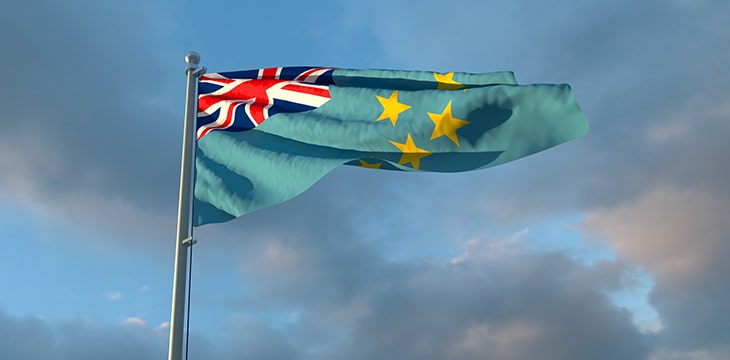|
Getting your Trinity Audio player ready...
|
The tiny Pacific nation of Tuvalu has announced plans to go fully digital and paperless—managing its important operations on the Bitcoin SV (BSV) ledger. The plan comes from a partnership between BSV consultancy firm Faiā, developers nChain, Elas Digital, and the Tuvaluan government.
Tuvalu represents both a challenge and an opportunity, with some of its natural disadvantages also working as advantages. Migrating infrastructure such as banking, currency management, and business dealings is simpler with a small population and a lack of legacy digital operations to replace.
As Faiā CEO George Siosi Samuels put it, Tuvalu could “leapfrog” other economies struggling to move to an all-digital, blockchain-based economy centered on the “Tuvaluan National Digital Ledger.” The partnership’s task is to deliver this ledger as a working demonstration of both blockchain technology and BSV’s ability to process the volumes of data required, as well as the security and stability of its fixed, “set in stone” protocol.
It’s a big job both for Tuvalu and BSV. As a nation-state-level project, it will inevitably attract a lot of attention—a factor that also has its pluses and minuses. Faiā, Elas Digital and nChain will consult closely with the government and people to determine exactly what’s needed (and what isn’t) before pushing ahead with the plan.
Elas Digital CEO Brendan Lee developed much of the basic concept, and the deal includes access to nChain’s vast intellectual property library and development experience.
nChain CEO David Washburn described the deal as “truly revolutionary,” saying the companies were “honored to have been charged by the visionary leaders of Tuvalu to enable this landmark shift toward a digital economy.”
Previous experience with the technology industry
Situated in the South Pacific Ocean due north of New Zealand and Fiji, Tuvalu is small and remote—an archipelago with a population of under 12,000 and few natural resources. Its situation has forced it to be creative in looking for new economic opportunities.
Curiously, one of the more novel “resources” Tuvalu has used to its fullest potential in the past is its “.tv” internet domain, which it has commercialized by selling its use to television networks and production companies (trivia: Tuvalu used its first payments from these sales to join the United Nations in 1999). It has similarly exploited its telephone area code, ship registry, fishing rights, and postage stamps.
As a result of this, Tuvalu’s government has decades of experience in dealing with the information and communications technology (ICT) industry. Its 12-year, US$50 million deal with IT firm Verisign over the sales of the .tv domain will expire in 2021, perfect timing to explore new directions.
Not naive outsiders with tech toys
This is not a case of naive foreigners moving into a culture they don’t understand to showcase a new technology concept. Samuels said a strong local element is essential to make it all work.
He developed an interest in the country due to his own Tuvaluan family heritage on his mother’s side. Samuels regards the Verisign/.tv deal as “a bargain” and thinks Tuvalu could turn the domain, which it will regain full control over, into “a huge cash cow” given how important it’s become to the properties that use it, and leverage that experience into developing a full digital/knowledge economy.
His five-point tech-centric development plan for Tuvalu, which he wrote and published in January 2020, involves opening the .tv domain to a bidding war, improving internet infrastructure, focus on digital transformation as an economic strategy, go cashless, and invest in land and property.
https://twitter.com/siosism/status/1341061735931932674?s=20
Though Tuvalu at this stage remains dependent on foreign aid to meet its budget, it has resisted offers from Chinese firms to build artificial islands in its waters. Two advantages it does have in the IT world are a high adult literacy rate (99%) and the fact that everyone there speaks English.
“Data is the new oil, and Tuvalu is taking the right steps to navigating this new area, just like our wayfinding ancestors did with the oceans,” Samuels said.
The Tuvaluan government noticed his plan and actually approached Samuels to explore his ideas further, which he was happy to do.
Simon Kofe, Tuvalu’s Minister for Justice, Communication and Foreign Affairs, reiterated the importance of being visionary while recognizing the nation’s culture and values in daily life and at the national policy level.
“While taking a values-based approach, however, our eyes are always fixed firmly on the future. Tuvalu is already a leading Pacific nation in terms of outreach and action on climate change, but we hope to become a leader in other areas as well, especially ICT. Through our partnership with nChain, Elas, and Faiā, we are optimistic that blockchain technology will provide a key platform for unlocking new opportunities and securing a greater future for Tuvalu.”
See also: Dr. Craig Wright’s presentation at CoinGeek Live, From the Internet to Bitcoin: The Digital Ledger to Advance the World’s Technology Infrastructure

 02-19-2026
02-19-2026 




